Month: November 2018
The promise of (practically) ‘serverless computing’
CS undergrad, Alyssa Hwang (SEAS ’20), Presented Her Research at Columbia, Harvard and Stanford Research Conferences
Hwang spent the summer working for the Natural Language Text Processing Lab (NLP) and the Data Science Institute (DSI) on a joint project, doing research on gang violence in Chicago.
What was the topic/central focus of your research project?
I used the DSI’s Deep Neural Inspector to evaluate an NLP model that classified Tweets from gang-related users.
What were your findings?
Through my research, I found that the DNI reported higher correlation between hypothesis functions and neuron/layer output in trained models than random models, which confirms that the models learn how to classify the data input.
The aggression model showed interesting correlation with activation hypotheses, and the same with the loss model with imagery, which implies that aggressive speech tends to be very active (intense) and that text containing loss tend to use language that is concrete rather than abstract. If I had more time to continue this research, I would love to explore different types and sentiments in text and how that would affect how well a model learns its task.
What about the project did you find interesting?
The most interesting part of my research was seeing how interconnected all of these disciplines are. I split most of my time between the Natural Language Processing Lab and the Data Science Institute, but I also had the chance to meet some great people from the School of Social Work–their work on gang-related speech is part of an even bigger project to predict, and later prevent, violence based on social media data.
How did you get involved in/ choose this project?
I’ve been working at the NLP Lab since freshman year and decided to continue working there over the summer. In my opinion research is one of the best ways to develop your skillset and ask questions to people already established in the same field. I knew I wanted to pursue research even before I decided to major in computer science, and I feel so grateful to be included in a lab that combines so many of my interests and develops technology that matters.
How much time did it take and who did you work with?
The project was for three months and I worked with CS faculty – Professor Kathy McKeown and Professor Eugene Wu.
Which CS classes were most helpful in putting this project together?
Python, Data Structures
What were some obstacles you faced in working on this project?
I had just finished my sophomore year when I tackled this project, which means that the most advanced class I had taken at that point was Advanced Programming. I spent a lot of time just learning: figuring out how machine learning models work, reading a natural language processing textbook, and even conducting a literature review on violence, social media, and Chicago gangs just so I could familiarize myself with the dataset. I felt that I had to absorb an enormous amount of information all at once, which was intimidating, but I was surrounded by people with infinite patience for all of my questions.
What were some positives of this project?
Through this project, I really started to appreciate how accessible computer science is. Half of the answers we need are already out on the internet. The other half is exactly why we need research. I can learn an entire CS language for free in a matter of days thanks to all of these online resources, but it takes a bit more effort to answer the questions I am interested in: what makes text persuasive? What’s a fair way of summarizing emotional multi-document texts?
Can you discuss your experience presenting?
Along with the Columbia Summer Symposium, I have presented my research at the Harvard National Collegiate Research Conference and the Stanford Research Conference.
Do you plan to present this research at any other events/conferences?
Yes, but I have yet to hear if I have been accepted.
What do you plan to do with your CS undergraduate degree?
Not sure yet but definitely something in the natural language understanding/software engineering space.
Do you see yourself pursuing research after graduation?
Yes! I loved working on a project that mattered and added good to the world beyond just technology. I also loved presenting my research because it inspired me to think beyond my project: what more can we do, how can others use this research, and how can we keep thinking bigger?
Midterm Elections: How Politicians Know Exactly How You’re Going To Vote
Here’s what happens to your information after you fill out a voter registration form.
WiCS at the 2018 Grace Hopper Celebration
Women technologists from around the world gathered in Houston, Texas to attend the Grace Hopper Celebration. Columbia’s Womxn in Computer Science (WiCS) share how it was to be part of the event that celebrates and promotes women in technology.
Xiao Lim
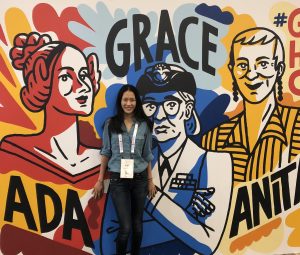
My favorite part about Grace Hopper was the raw experience of walking into the opening keynote and seeing over 20,000 women in tech. I think it’s easy to get bogged down by what we perceive as the status quo, but going to Grace Hopper reminded me that what is “normal” can and will always change. I can’t wait to see the future built by these women, and am proud to know that I am part of the change I want to see.
Lucille Sui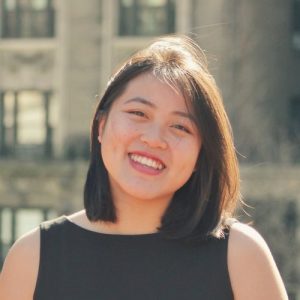
My favorite part about attending Grace Hopper was meeting so many amazing and inspirational women and also getting closer with the women I came with from Columbia! I learned a lot about the different paths in life that you can pursue with a computer science degree, from working on the Sims game to working on the tech enabled side of Home Depot. I would encourage everyone to attend this event because it’s an amazing way to meet other women in the field and understand the horizon of limitless potential you have as a woman in tech.
Kara Schechtman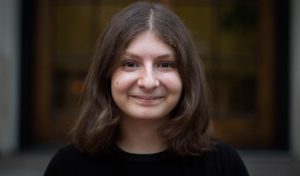
Attending Grace Hopper is always such a meaningful experience as a woman in technology. It was my second time attending the conference, and both years I’ve been heartened to see the big crowds of women (and allies!) at the conference.
In addition to being in a woman-dominated space, it is really exciting to see that women are passionate about fixing many of tech’s problems; there were long lines for speakers like Joy Boulamwini who tackles bias in algorithms. For me, the most memorable experience was attending a talk given by Anita Hill the day after Christine Blasey-Ford’s hearing. Her words of advice to not give up on creating positive change were ones I really needed to hear that day. I hope I’ll be able to attend the conference for many years to come!
Madeline Wu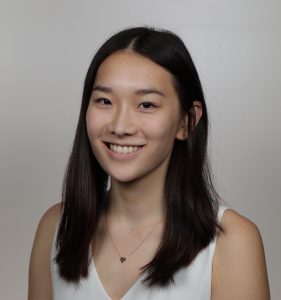
I had no idea what to expect from my first Grace Hopper experience, but was so glad I got to do it with fellow Barnard/Columbia seniors who also attended GHC through the WiCS sponsorship. Being at a conference with 25,000+ women in computer science is simultaneously inspiring and overwhelming, so I appreciated having other WiCS students to exchange tips with on the best giveaways, share what workshops we were attending, and to wish each other luck on interviews.
Some of my closest friends in college are fellow Barnard CS seniors who attended GHC with me, and throughout our three days in Houston we connected with women in tech from all backgrounds and interests, learned how to play poker with Palantir, enjoyed a mac and cheese themed Snapchat party, and tried all the Tex-Mex we could find. I went into this semester feeling a little burnt out, but seeing so many women in CS in one place and seeing how much companies are investing in women in tech re-motivated and inspired me to give everything my best effort senior year. Despite the giveaways and opportunities that GHC is most known for, I am most grateful that I got to experience GHC’s unparalleled sense of community with women who have been integral to my college journey!
Vivian Shen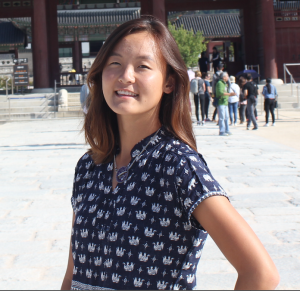
I loved going to Grace Hopper because for once in my life, I was in an environment where womxn greatly outnumbered men at a giant, respected tech conference. As students, we try to carve out spaces for womxn in tech with our incredible clubs (Girls Who Code, Womxn in Computer Science, etc.), who hold various talks and gatherings and workshops. However, the experience is completely different when you are surrounded by thousands and thousands of womxn rather than just a handful, and these womxn come from all the corners of the globe to support each other in their technical pursuits. Not once during the week did I feel like I was talked down upon or “mansplained,” and it truly felt like every person I talked to, be it employer or peer, wanted me to succeed (and I wanted them to as well!). Sure, one of the biggest benefits of the Grace Hopper Conference is its giant career fair, where many students are able to find job offer(s).
However, I felt like the companies weren’t just there to find talented womxn engineers – they were also trying to prove that their company is inclusive and welcoming of diversity. It may seem strange to put it that way, but I believe that as these companies work to outdo each other in terms of inclusivity, they really do create better atmospheres for their workers. I’m more than happy to let companies show off all of their equity initiatives, especially when they are then receptive to feedback when we sometimes say that these initiatives aren’t doing enough.
At the conference, there were 50+ students from Columbia/Barnard, who all got sponsored in separate ways. I was lucky enough to receive a Microsoft scholarship out of the blue (I have had no prior connection with that company), so my main piece of advice to students who would like to attend GHC in the future is just to apply, apply, apply! Because it is such a renown conference, there are tons and tons of companies who offer sponsorship to those with a good enough reason to want to go, and filling out many applications increases your chances of getting funded by one of these. When it hits June, start looking for GHC scholarships on Google (I know it’s early, but trust me, you want to keep an eye on those things). Then, when you get in, I’m sure you’ll have a whole crowd of Barnumbia womxn (and peers from all over) who will be excited to attend and support you at the conference.

